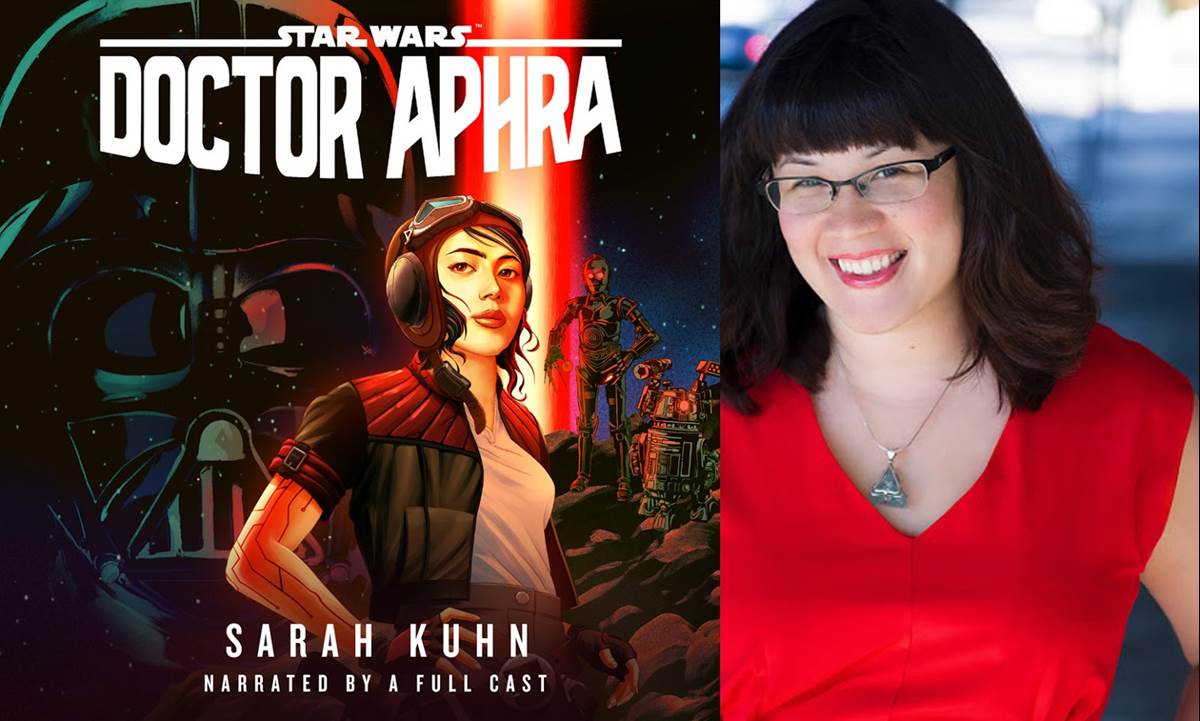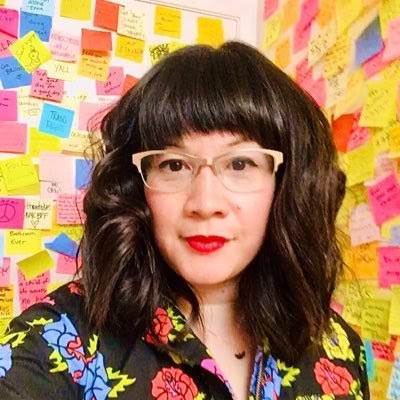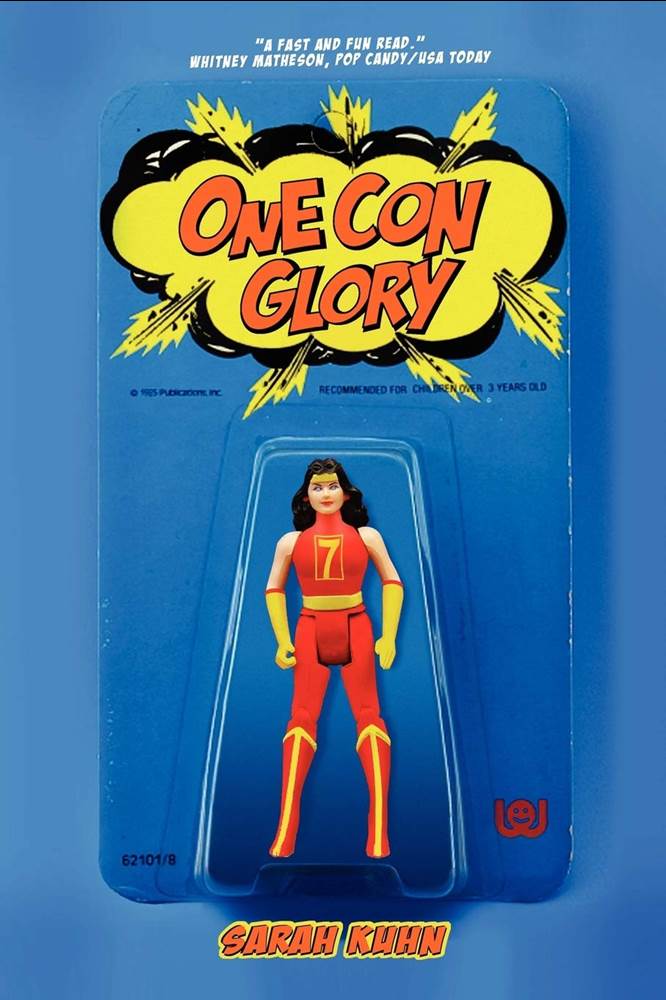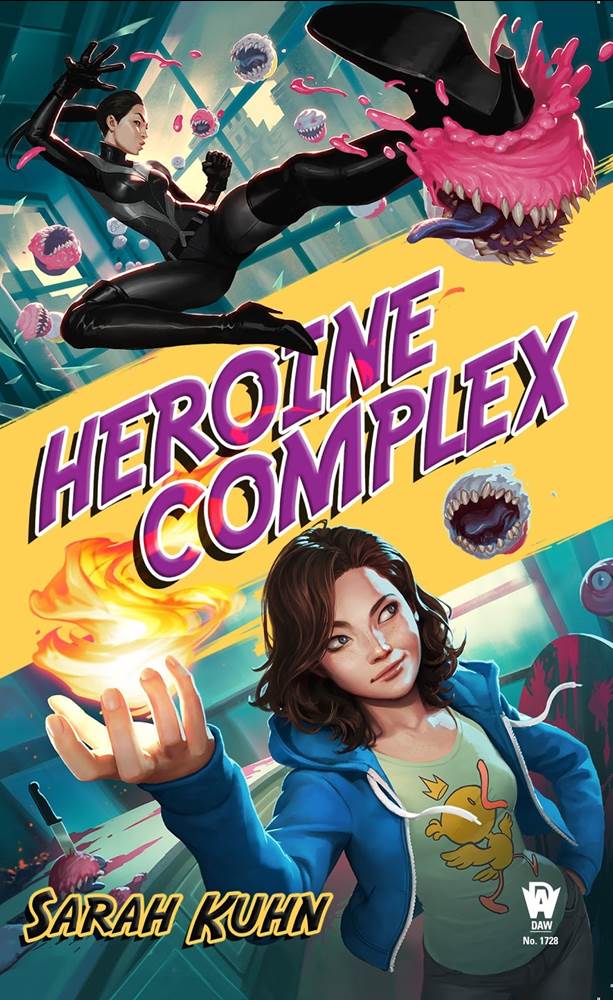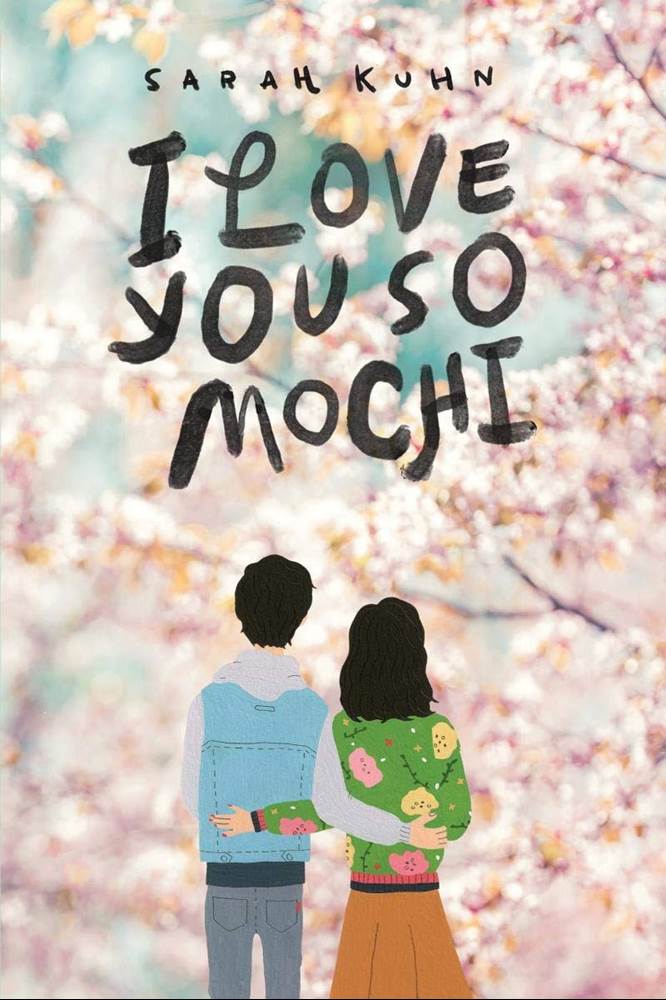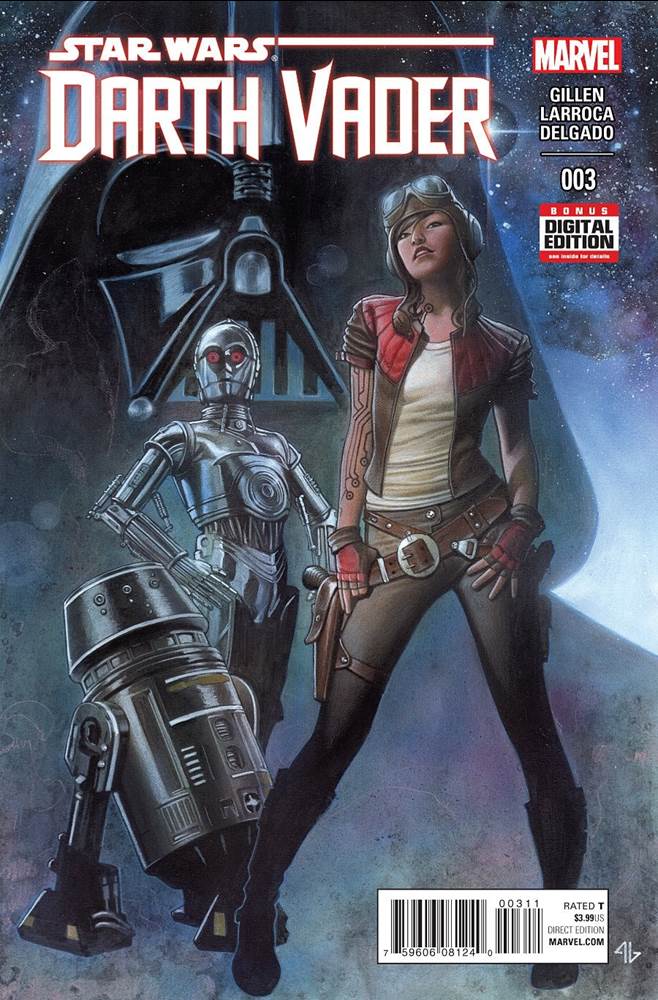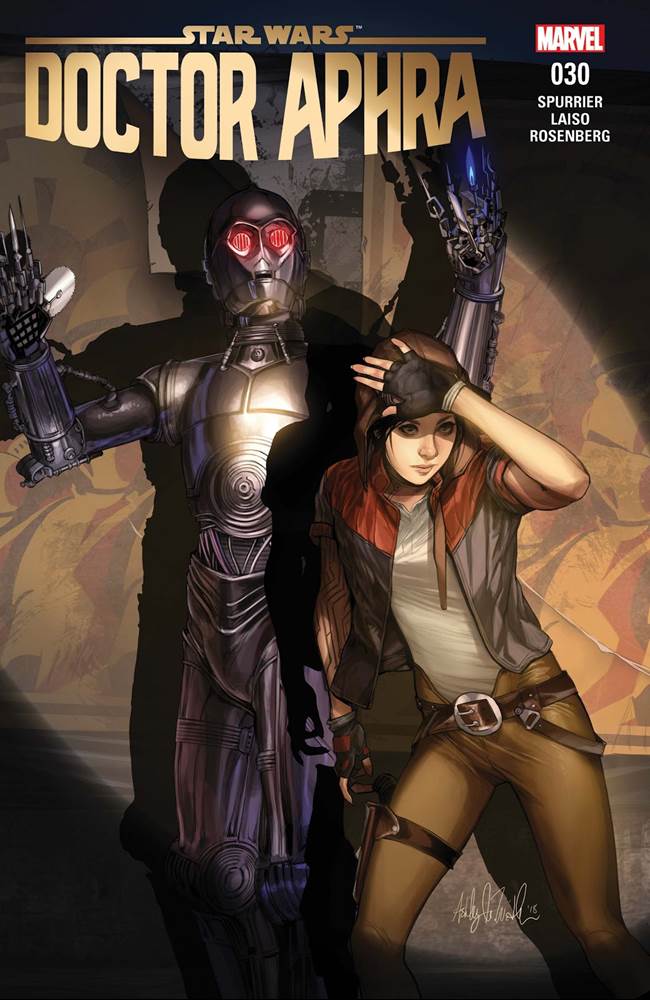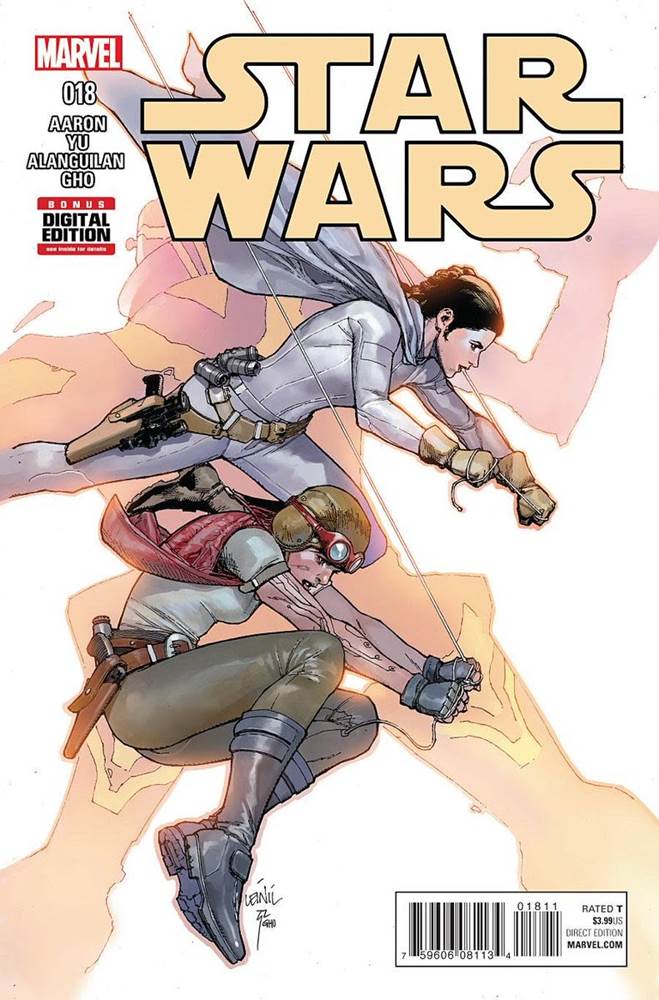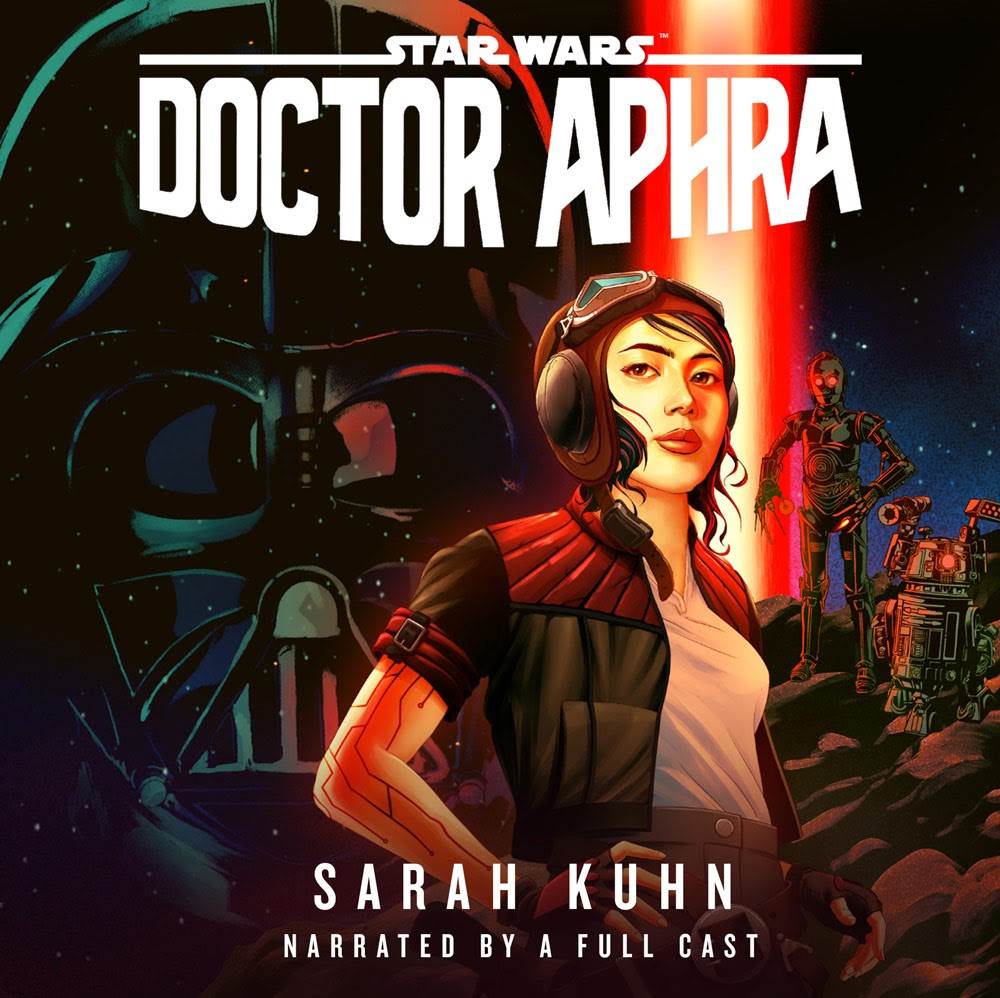Interview – Author Sarah Kuhn Discusses “Star Wars: Doctor Aphra – An Audiobook Original”
Author Sarah Kuhn has been steadily contributing to the world of fantasy and romantic-comedy fiction for the past decade. Her latest project-- just released last week-- is the full-length audio drama entitled Star Wars: Doctor Aphra - An Audiobook Original, which adapts the first few arcs of the rogue archaeologist's appearances in Marvel Comics’ 2015 Star Wars titles.
I recently had the pleasure to speak with Sarah Kuhn about her career in writing, how she landed her dream Star Wars gig, and what appeals to her the most about Doctor Aphra as a character.
Mike Celestino, Laughing Place: Thank you so much for joining me today.
Sarah Kuhn: Yeah, of course. Thanks for having me.
LP: I really enjoyed the audiobook, but for my first question, I want to start at the beginning. What was your relationship like with Star Wars growing up?
Kuhn: Well, I think like a lot of people I certainly consider it one of my formative texts, and probably my first real fandom. I was introduced to the movies when I was a child-- the Original Trilogy-- and I was just obsessed with them to a degree that was probably somewhat disturbing. But I feel like now that I've met so many people that had the same experience, it just feels like a connective tissue that binds a lot of us. I was obsessed with them. I really wanted to be Princess Leia. I really wanted my hair to sit in those cinnamon buns, but my hair is very thick and unruly, and it was not really in the cards unless we used a lot of hairspray. I think [Star Wars is] one fandom I've also held onto all my life. There are some things that have come and gone, but that has certainly been a constant. I don't really think that I ever thought I would be doing an interview like this, talking about the time that I got to write Star Wars. All of this is honestly still pretty mind blowing.
LP: Let's take a step back from Star Wars and talk about your writing career. How did you get started in that field?
Kuhn: Well, in kind of an interesting way, which I think is probably true of most writers. I'm Asian-American. I'm a third generation mixed-race Japanese-American, and my mom was Japanese-American, and she was a pretty classic Asian-American tiger mom. She really wanted me to grow up to have a job where I would have health insurance, [something] very responsible, and so I don't think I ever saw writing as something you could do as a job. That just seemed so outlandish. Anything creative, I think, seemed so outlandish, thinking of it as something you could do as a job. And I always loved writing. I always loved making up stories. I loved all of it, and so in middle school some friends and I started what I now know was a ‘zine. It was basically a photocopied little newsletter, and we wrote about things that were only interesting to us, like what was happening in The Babysitters Club books or who cheated on their math test. It didn't have very big circulation, but that led me to journalism, which someone told me was a job where you could write every day and get paid-- and I'm not sure if in our current climate that's actually still true, but at least then it was.
So I ended up becoming a journalist. I was an entertainment journalist for a long time. I covered a lot of the things that I was a fan of. I was lucky enough to do that. And I still had a lot of creative writing things I did on the side, but again, I never really saw that as a career. It wasn't until I wrote this serialized short story which was a romantic comedy set at a comic book convention. It's called One Con Glory. I wrote it basically just for me and my friends. We had a little online ‘zine called ‘Alert Nerd’ and we ended up putting out these PDF ‘zines for people to read, and I serialized that story there, and that actually quite surprisingly led to the career that I have now. It ended up getting a fandom, I think, because it starred a very opinionated nerd girl, and there actually weren't a lot of characters like that around that time, at least characters who were protagonists, who were the center of the story.
And I ended up [writing] a novel called Heroine Complex, which is a superheroine novel. It's about Asian-American superheroine fighting evil like demonic cupcakes and supernatural karaoke in San Francisco, and that got me an agent who is actually a fan of the Comic-Con rom-com I had written. It ended up selling and everything went from there. I'm guessing it's always interesting for any writer-- or anyone who does anything creative-- to trace their path, because obviously there's no one path. They're always a little bit different.
LP: So beyond Heroine Complex and One Con Glory, I want to go through a couple of the other entries in your résumé, if you could just tell me a little bit about what each project was. Let’s start with something called the Chicks Dig Comics Essay Collection.
Kuhn: That was a fabulous essay collection. It was basically a bunch of women writing about comics, and if I remember correctly, I wrote an essay about how I always hated the versus battle, like what's better than what, who's better than who, because I loved both the [X-Men] characters Jean Grey and Emma Frost, and I always wanted there to be a story where they were friends. Actually, the writer Seanan McGuire and I have this longstanding story idea that we talk about sometimes, which is that those two characters go on a road trip and just basically have an awesome time with all of their mutant powers. I wrote about why I don't like that versus battle, because it felt like it wasn't okay for me to love both of those characters equally and fully and passionately. That was a long time ago. I think that's what I wrote about. I don't totally remember.
LP: Then you've written some actual comic books. There's Barbie comics, Clueless comics, and more recently, Batgirl comics. Can you talk about some of those?
Kuhn: Of course. I've been lucky enough to play with a lot of different toys in comics. That's been very exciting. I wrote some Barbie comics where she was an aspiring fashion designer. I think my pitch for Barbie was I felt like she was like Elle Woods from Legally Blonde meets Twilight Sparkle from My Little Pony. She has that can-do attitude, because if we know one thing about Barbie, it's that she can do anything. She's been an astronaut, she's been a doctor, she's been a pet-sitter, she's been all kinds of things. So we explored her up-and-coming fashion career. Then Clueless I wrote with my friend Amber Benson and the artist Siobhan Keenan. That was an amazing collaboration. They are continuations of Clueless. The first one was the girls Cher, Tai, and Dionne during their senior year and then the second book was their summer vacation right before they go to college. Since Clueless was a reinterpretation of Emma, we [sought inspiration from] some other Jane Austin stories that we tried to reinterpret a little bit. That was a lot of fun.
Then Shadow of the Batgirl, which came out earlier this year-- which is crazy, because it feels like that was 14 million years ago-- that is about Cassandra Cain, who is the Asian-American Batgirl. She's always been a favorite character of mine; I love her so much. She is a tiny, tender murder-baby who was raised by an evil assassin father to be a living weapon, and instead she decides to become a hero. That book is a retelling of her origin for a new [young-adult] audience who maybe doesn't know Cassandra Cain. That was [created] with Nicole Goux, who is an amazing artist. Our editor is Sarah Miller, and we became our own little Batgirl gang bringing her to life. That story was very close to my heart, just because I thought it was so wonderful to show this teenage girl who had been told all her life she doesn't have a choice in anything-- doesn't really know what it even means to have a choice at all. And then the minute she's actually able to make a choice for herself, she makes a choice to pursue that path of hero-dom. We had so much fun writing her.
We also got to do Barbara Gordon as Oracle-- she's one of her mentors. Then we got to create a new character, which is always fun, to get to add to the canon. We created a character named Jackie, who is a classic Asian auntie. She owns a noodle shop, she feeds people too much, and she likes to wear loud clothes in clashing print. We made her Cassandra's other mentor because for me it was important to show that this young Asian-American girl would [have as] one of her most important mentors another Asian-American woman. That's something that's been very important to me in my own life, and I wanted to put that on the page. We were able to do that and it was a lot of fun.
LP: And one of your most recent projects was a young adult novel called I Love You So Mochi.
Kuhn: Yes, that came out last year. That was actually my YA debut. It's a contemporary rom-com, which is interesting because other than that first little novella, I haven't gotten to write a lot of contemporary [fiction] where there's no magic, there's no super powers, there's no adventures in space. It's just people being cute and having wonderful adventures and having interpersonal conflicts. That was a lot of fun. It's basically about this Japanese-American girl who gets the chance to go to Japan for the first time and visit her estranged grandparents. And, as hinted at by the title, she ends up falling in love with a boy who is an aspiring med student who is also a costumed mochi mascot, because in Japan there are a lot of amazing mascots basically for everything. They go to a lot of beautiful locations, they see a lot of sights, they eat a lot of great food-- including a lot of mochi, of course. They also eat at Japanese McDonald's, which was maybe a slight detour for some people, but I thought that was important to show. It's just a lot of fun and the main character ends up figuring out what she wants to do with her life. I think when you're that age that's something that is always at the forefront of your mind.
LP: How did writing the Doctor Aphra audiobook come about for you?
Kuhn: Well, I got a phone call, which I think is the phone call a lot of us hope to get, certainly. When I started writing, obviously one [franchise] that was always in my sights was Star Wars. Who doesn't want to write Star Wars? So I got a call from my agent, and usually these days it's more of an email. Most communications are email-- they don't really require a phone call, but I knew it was important because she was calling me. So I was like, ‘Oh, I better answer,’ and she said, ‘I knew I had to call you about this because you have an offer for Star Wars.’ There was a lot of screaming, and that was even before she got to what it was about. Basically if I could have chosen any [Star Wars] character for myself, I think it would have been Aphra. So when she said ‘Aphra,’ [there] was more screaming, and it was just really exciting. It was that magical phone call that I think a lot of us dream of getting someday.
LP: What appeals to you most about Chelli Aphra as a character?
Kuhn: I mean, so many things. I think there's maybe two [main] parts of it-- first of all, the obvious representational part. She looks like me. It's hard to explain how powerful that is, when you spend your entire life being such a fan of a certain media or a certain franchise, or even just pop culture in general. I don't think I ever really expected to see a face like mine in Star Wars. That just seemed so out of the question, especially as a main character. The fact that she really gets to be a main character is very exciting. And I love that she means so much to so many people. There are so many people who have been able to see different aspects of themselves in her. Then the second part is that she is just such chaos. What could be more fun than that? She's such chaos, and I really love that inherent conflict in her. She runs towards chaos. She wants all these thrills, she loves danger. She purposely puts herself in the most dangerous situations possible because she wants that, but she also is a survivor. That's really who she is at heart when you strip everything away. She's been able to survive so much in her life, and she always, no matter what, finds that way to get through. I hadn't really thought [about this] in-depth because I was experiencing the character until this point as a fan.
When I was re-reading the comics in preparation for this, there was a line that stood out for me that I put in the initial idea pitch/outline, which is ‘The way I've lived, I know I'm lucky to be alive.’ That was obviously the great Kieron Gillen; he wrote so many amazing lines for her. The way that he and Salvador Larroca just put her on the page immediately and made her a person that you could not look away from is so arresting, and that line really unlocks the way I felt about her and the way that I wanted to write her.
LP: After that point, what was your approach to the process of adapting the story from the comics?
Kuhn: First I re-read all the comics and my fabulous editor Elizabeth Schaefer, who also loves Aphra very much, also re-read the comics. That was where I pulled that line out of and was crafting this [audiobook] around this idea. We had some conversations, both with her and with Nick Martorelli, who did all the amazing production on the audiobook and created all these amazing soundscapes and directed the actors and put the whole thing together, about what we thought this was. The first big-picture decision we had to talk about was, ‘How is this story being told and who is telling it?’ There was an option for Triple-Zero [to be] narrating this, maybe someone else, but I always felt-- and I think they did too-- that one of the most powerful things we could do is tell this in Aphra's voice from her [point-of-view], because she's so much fun and she is also the most unreliable narrator ever. So sometimes there's a question about, ‘Is what she’s telling us actually the way it happened?’ We have this other document of how it happened in the comic books, but what is she going to embellish here or change or bake into something that makes her look better? So we want to tell this in her voice from her POV. We want to make it a first-person kind of thing, because I do really like writing in first person.
We went from there, and then I did the outline pitch document where I just said, ‘Here's what I think the bigger story is. Here's what I think we're taking from the comic books. Here are some things that are not in the comic book. Here is this framing device,’ which was another big-picture thing that I came up with where she's recording this and we don't totally know why, except that obviously she's Aphra-- she probably wants to keep a really overly grandiose record of her adventures. That was a lot of fun, because Elizabeth really pushed me to use that and use the audio format as much as possible. This is Aphra telling this [story], so remember she's going to erase parts of this recording she's making. She's going to rewind it and re-record it to make herself sound better. There are parts where things are maybe getting a little too real that she doesn't want us to hear.
That was really fun. Obviously whatever the format is, you make the best use of it-- you can play with it. Once you get to know it, you can break some rules. With this, [there] was definitely active encouragement to lean in to the fact that we were doing an audiobook version of these events. With this narrator, it actually lent itself really well to playing with [the format] and seeing how she specifically would use it. Of course [with] something like this, you look at the source material, [and] it's so brilliant. There were so many great lines that I was like, ‘We're not going to change that.’ I want to hear that line. I want to hear a lot of this great Kieron Gillen dialogue. I just want to hear it. [And] it was really exciting to be able to come up with, ‘What are the new pieces of Aphra's perspective?’ One of the things I had the most fun with was this long internal monologue throughout the whole book about what she is actually thinking during these events, because we may have been able to guess but not totally know from the comic book.
LP: You’ve also added a series of flashbacks to Aphra during her university years that serve as little interludes between the action. Tell me about coming up with those segments.
Kuhn: The flashbacks mostly came out of this idea I had when we were thinking about the big picture of it. I love Sana Starros and I love [her] relationship [with Aphra]. Most of what we've seen of it is the aftermath, where they just absolutely hate each other, which I also love because they have such great chemistry, and they are so fun to read and watch. I had this question when I was reading [during] the sequence near the end that's in Sunspot Prison where they're just at each other's throats the whole time, and Sana is actually actively trying to kill Aphra pretty much during that whole sequence. I was like, ‘I wonder what they were like before. I wonder what they were like when they were in love. I wonder what they were like when it was soft between them, even though these two characters are not really what you would ever describe as soft.’ I wanted to go back and illuminate that. I wanted to imagine what it was like when they first met, what it was like when they were seeing each other, what it was like when they were falling in love.
I'm also a big romance writer and reader. The Heroine Complex books are a mix of fantasy and romance, and hence we call them ‘romantasy.’ As a child I didn't know this term, but I think I was already a shipper because one of the parts that [made me rewind] the videotape the most was all the parts in Empire with Han and Leia. I watched those so many times and I read [those] parts in the novelization so many times that the pages were worn out. I'm a huge Star Wars romance person, and the fact that I had a way of exploring a Star Wars romance, especially a Star Wars romance that I'm very invested in, even though once we meet these two characters it's over, that was something that I wanted to explore.
I also thought it could open up a piece where we could see Aphra-- even though she has a hard time admitting this-- actually being a little bit vulnerable, and we could see where some of that bravado comes from, where the swagger comes from, maybe what she's trying to cover up sometimes. Of course that was interesting to me as a writer. I loved exploring that. There's this recurring theme where she keeps falling off things. She's courting Sana in her own way, which is not the way that usually looks like. She keeps falling off of things or falling down things, or just being disrupted because she can't handle the fact that she sees this person and she is just so attracted to her immediately. I just loved that. I felt like the fact [that] she keeps falling off of things, and that became this recurring theme, seemed very Aphra to me. It's very ‘chaos.’ It's very what she's all about. That was how I thought of that and then how we teased it out.
LP: In this story, Aphra gets to interact with Han Solo and Princess Leia and a handful of other Star Wars characters that we’ve known and loved for many years-- Darth Vader, of course, being the biggest example. What was it like writing for those more well established personalities rather than the newer characters?
Kuhn: It was obviously mind-blowing when you write the words ‘Darth Vader’ or ‘Princess Leia’ in the script, and you're then writing dialogue for them. That's mind-blowing, come on. One of my favorite parts was an extended battle between BT-1 and R2D2, so the dialogue on that [scene] is just them beeping at each other, but they had different kinds of beeps. I was talking with Elizabeth about that and how there [was] this day where I ‘wrote’ this scene where it's just them beeping at each other, and I was like, ‘If I describe this to someone it sounds like I'm making it up. It's so ridiculous.’ But it's so fun and it's mind-blowing. Getting to even put those characters’ names on the page was something I didn't even know I would be doing at any point. With a lot of the classic characters, a lot of their dialogue was from the comic books, but sometimes I would get to write new things for them, which was very exciting.
Probably the longest new thing I wrote with an established character who is not Darth Vader was the scene between Aphra and Boba Fett. We wanted to show the part in the Vader comic where Aphra is offscreen, and you're like, ‘What was she doing?’ We had a lot of fun thinking about, ‘What would she be doing? Is there a hint about what she was doing?’ In that sequence, Vader's off his ship and he's left her in charge for some reason, and she's, of course, done all of the things that Aphra would do, like taking apart and putting together all the weapons, and she's had a dance party, and then she has to talk to Boba Fett because he has information for Darth Vader. Getting to write that exchange between them was so fun because he is obviously a character who is very opposite her in how he sounds and how he interacts, so it was fun seeing her just being irreverent with him. I think she calls him ‘Boba Man,’ and he keeps having to say, ‘No, it's Fett. Boba Fett. Get my name right.’ Those parts felt unreal. I still can't believe that I wrote that and someone recorded it and they put the Star Wars theme in front of it. That's pretty amazing.
LP: Tell me about the cast for the Doctor Aphra audiobook. Did you have any input on the casting and what has your reaction been to getting to hear it?
Kuhn: I actually haven't heard the whole thing yet. They just sent it to me, but I have heard at least the first hour or two. [The cast is] amazing. It's hard for me to even put into words how amazing they are. I didn't know who was playing anyone [until recently]. They sent me the cast list when we recorded a panel for this year's San Diego Comic-Con, which is Comic-Con@Home, so it's virtual. We recorded all the panels beforehand. They told me then, ‘You're recording this panel with Emily Woo Zeller, who is Aphra, and Marc Thompson, who is Darth Vader, and a bunch of other voices.’ Then they showed me the whole cast list, and honestly I was blown away, and I was [also] blown away when I heard them. I think a lot of people were like, ‘What does Triple-Zero sound like?’ I was like, ‘Actually, I don't know. I mean, I have kind of an idea, but I'm actually not sure.’
I love the voice that they came up with for that. That was Sean Kenin. A fun thing about Emily is they sent me this thing like, ‘Emily Woo Zeller, she's playing Aphra.’ I had heard of her before because she's a very prominent Asian-American audiobook reader, and we are doing audiobooks of the Heroine Complex series. There are four full novels now and people ask me every week when there will be audiobooks. They had sent me a few samples of different narrators, and they were like, ‘Can you give us a few choices? We don't know what the scheduling will be." I was like, ‘Of course.’ Then I listened to the samples and I was like, ‘Can you just please get Emily Woo Zeller for me because she is the perfect voice and I need her.’ They were like, ‘Okay.’
The fact that those two things happened within a week of each other-- I found out Emily was Doctor Aphra and then I also found out they had gotten her for Heroine Complex-- that is amazing. Her performance just blew me away. She got the swagger, she got the vulnerability, she got all the jokes and the fast talking. Now when I hear Aphra I hear Emily. That's who I hear in my head. I think a lot of people hear her in their head. Also, Nicole Lewis is Sana Starros. They had such amazing chemistry together. Because of the pandemic everyone had to record separately in their houses, and they did an amazing job-- Nick Martorelli directed them. It all sounds very cohesive, but Emily and Nicole got to record a few of their scenes together on Skype or Zoom to really bring that chemistry out. I thought that was wonderful and it worked really, really well. They're just amazing. I feel like I'm grasping for the right superlatives here, because they were all just so amazing. I should mention that Marc Thompson also voiced all of the Wookiees, because there are multiple Wookiees. Sometimes in the dialogue it's just this Wookiee roar, so I would put in brackets like, ‘This is triumphant. Triumphant Wookiee roar. This is sad. Sad Wookiee roar. This is petty Wookiee roar." So on the panel we were like, ‘Can you do petty Wookiee roar?’ He did it, and it's pretty amazing.
LP: I feel like this Doctor Aphra audiobook will be great to catch people up on who the character of Aphra is and how she got introduced into the story. Is that your hope for how it's received?
Kuhn: Well, I hope that it can be enjoyed no matter what your relationship with Doctor Aphra is. If you're an Aphra superfan, I hope that you love it. If you are a fan of the comic, I hope that it is something that you can enjoy as this story that is being brought to life, and now there is also some extra context and maybe a different point of view and some extra things that were happening between the scenes that we saw. Because as a fan of the comic and of Aphra, I want those fans to feel satisfied. Then also, because it is based on her introduction and her first appearance, it is intended as something that you can listen to and consume even if you haven't read anything about her before. I hope it does both things-- satisfying those fans who have been waiting to hear what Aphra sounds like and maybe have been waiting to hear some of these favorite scenes dramatized. I also hope that it brings her some new fans who will hopefully then go and read all the wonderful comics that have been written and are still being written about her. I would love it if we had an Aphra-- what would the word be-- an ‘Aphraissance’ in Star Wars. I think that would be cool.
LP: My final question is what does the future hold for you, and what else do you think-- or hope-- the future holds for Doctor Aphra?
Kuhn: Good question. Well, I am still writing many things. I'm still writing my Heroine Complex series. That will be at least six books. The fourth one just came out-- it's called Haunted Heroine, and it's actually my Halloween Babysitter's Club super special, because it takes place during Halloween, even though it came out during summer. Maybe it will give you something to look forward to. I also wrote an Archie middle-grade graphic novel called The Riverdale Diaries: Hello Betty. It's basically Betty and Veronica and all your favorite Archie characters in middle school-- that's with the amazing artist J. Bone. Then I have another YA contemporary novel coming out next year called From Little Tokyo With Love, which is a modern fairy tale with a mixed-race Japanese-American girl growing up in Los Angeles's beautiful Little Tokyo neighborhood, which I can't really go outside and experience right now, but trust me, it's amazing.
As far as for Aphra, I hope that she becomes-- if she's not already-- one of the biggest, most popular characters in all of Star Wars, because I just feel like she deserves it. I feel like she thinks she deserves it as well. [laughs] And I would certainly love to revisit her if the opportunity ever came up. I feel very lucky and very honored to be among this list of superstar writers: Kieron Gillen, Simon Spurrier, Alyssa Wong, all these superstar writers who have gotten to write her stories. I'm just so happy to be included amongst them, and I would love to write more stories for her. I would love to write more Star Wars, obviously. I hope that there's a lot in store for the future, and who knows, but I hope that maybe me and Aphra aren't done yet.
Star Wars: Doctor Aphra - An Audiobook Original is available now wherever audiobooks are sold. The full audio from this interview is included in the latest episode of Laughing Place’s “Who’s the Bossk?” Star Wars podcast.



